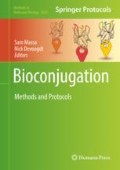Abstract
Random conjugation of chemical linkers to endogenous lysines or cysteines within an antibody yields a heterogeneous mixture of conjugates with various drug-to-antibody ratios. One approach for generating homogeneous antibody conjugates utilizes enzymatic transfer of payloads onto a specific glycan or amino acid residue. Microbial transglutaminase (MTG) is an enzyme that catalyzes the formation of a stable isopeptide bond between a glutamine and a lysine. We have previously identified and reported several sites throughout the antibody structure where an engineered lysine is sufficient for transfer of a glutamine-based substrate onto the antibody. Whereas other enzymatic transfer strategies typically require significant antibody engineering to either modify the N-glycans or introduce a multi-amino acid enzyme recognition site, the lower contextual specificity of MTG for lysines allows just a single lysine point mutation in an antibody to be efficiently transamidated. Here we describe the molecular positioning of these single engineered lysine residues and the conjugation conditions for producing homogeneous antibody conjugates exemplified using azido- and auristatin F-based acyl donor substrates.
Access this chapter
Tax calculation will be finalised at checkout
Purchases are for personal use only
References
Albone EF, Spidel JL, Cheng X, Park YC, Jacob S, Milinichik AZ, Vaessen B, Butler J, Kline JB, Grasso L (2017) Generation of therapeutic immunoconjugates via residue-specific conjugation technology (RESPECT) utilizing a native cysteine in the light chain framework of Oryctolagus cuniculus. Cancer Biol Ther 18(5):347–357
Spidel JL, Albone EF, Cheng X, Vaessen B, Jacob S, Milinichik AZ, Verdi A, Kline JB, Grasso L (2017) Engineering humanized antibody framework sequences for optimal site-specific conjugation of cytotoxins. MAbs 9:1–9
Junutula JR, Raab H, Clark S, Bhakta S, Leipold DD, Weir S, Chen Y, Simpson M, Tsai SP, Dennis MS et al (2008) Site-specific conjugation of a cytotoxic drug to an antibody improves the therapeutic index. Nat Biotechnol 26(8):925–932
Chen XN, Nguyen M, Jacobson F, Ouyang J (2009) Charge-based analysis of antibodies with engineered cysteines: from multiple peaks to a single main peak. MAbs 1(6):563–571
Gomez N, Ouyang J, Nguyen MD, Vinson AR, Lin AA, Yuk IH (2010) Effect of temperature, pH, dissolved oxygen, and hydrolysate on the formation of triple light chain antibodies in cell culture. Biotechnol Prog 26(5):1438–1445
Hallam TJ, Smider VV (2014) Unnatural amino acids in novel antibody conjugates. Future Med Chem 6(11):1309–1324
Beerli RR, Hell T, Merkel AS, Grawunder U (2015) Sortase enzyme-mediated generation of site-specifically conjugated antibody drug conjugates with high in vitro and in vivo potency. PLoS One 10(7):e0131177
Madej MP, Coia G, Williams CC, Caine JM, Pearce LA, Attwood R, Bartone NA, Dolezal O, Nisbet RM, Nuttall SD et al (2012) Engineering of an anti-epidermal growth factor receptor antibody to single chain format and labeling by Sortase A-mediated protein ligation. Biotechnol Bioeng 109(6):1461–1470
Swee LK, Guimaraes CP, Sehrawat S, Spooner E, Barrasa MI, Ploegh HL (2013) Sortase-mediated modification of alphaDEC205 affords optimization of antigen presentation and immunization against a set of viral epitopes. Proc Natl Acad Sci U S A 110(4):1428–1433
Drake PM, Albers AE, Baker J, Banas S, Barfield RM, Bhat AS, de Hart GW, Garofalo AW, Holder P, Jones LC et al (2014) Aldehyde tag coupled with HIPS chemistry enables the production of ADCs conjugated site-specifically to different antibody regions with distinct in vivo efficacy and PK outcomes. Bioconjug Chem 25(7):1331–1341
Josten A, Haalck L, Spener F, Meusel M (2000) Use of microbial transglutaminase for the enzymatic biotinylation of antibodies. J Immunol Methods 240(1–2):47–54
Mindt TL, Jungi V, Wyss S, Friedli A, Pla G, Novak-Hofer I, Grunberg J, Schibli R (2008) Modification of different IgG1 antibodies via glutamine and lysine using bacterial and human tissue transglutaminase. Bioconjug Chem 19(1):271–278
Jeger S, Zimmermann K, Blanc A, Grunberg J, Honer M, Hunziker P, Struthers H, Schibli R (2010) Site-specific and stoichiometric modification of antibodies by bacterial transglutaminase. Angew Chem Int Ed Engl 49(51):9995–9997
Strop P, Liu SH, Dorywalska M, Delaria K, Dushin RG, Tran TT, Ho WH, Farias S, Casas MG, Abdiche Y et al (2013) Location matters: site of conjugation modulates stability and pharmacokinetics of antibody drug conjugates. Chem Biol 20(2):161–167
Dennler P, Chiotellis A, Fischer E, Bregeon D, Belmant C, Gauthier L, Lhospice F, Romagne F, Schibli R (2014) Transglutaminase-based chemo-enzymatic conjugation approach yields homogeneous antibody-drug conjugates. Bioconjug Chem 25(3):569–578
Siegmund V, Schmelz S, Dickgiesser S, Beck J, Ebenig A, Fittler H, Frauendorf H, Piater B, Betz UA, Avrutina O et al (2015) Locked by design: a conformationally constrained transglutaminase tag enables efficient site-specific conjugation. Angew Chem Int Ed Engl 54(45):13420–13424
Yokoyama K, Nio N, Kikuchi Y (2004) Properties and applications of microbial transglutaminase. Appl Microbiol Biotechnol 64(4):447–454
Strop P (2014) Versatility of microbial transglutaminase. Bioconjug Chem 25(5):855–862
Kieliszek M, Misiewicz A (2014) Microbial transglutaminase and its application in the food industry. A review. Folia Microbiol (Praha) 59(3):241–250
Spidel JL, Vaessen B, Albone EF, Cheng X, Verdi A, Kline JB (2017) Site-specific conjugation to native and engineered lysines in human immunoglobulins by microbial transglutaminase. Bioconjug Chem 28(9):2471–2484
Acknowledgments
We thank Ben Vaessen for his work optimizing the MTG reaction conditions, Dr. Xin Cheng for ESI-MS analysis, and Sara Jacob for antibody purification.
Author information
Authors and Affiliations
Corresponding author
Editor information
Editors and Affiliations
Rights and permissions
Copyright information
© 2019 Springer Science+Business Media, LLC, part of Springer Nature
About this protocol
Cite this protocol
Spidel, J.L., Albone, E.F. (2019). Efficient Production of Homogeneous Lysine-Based Antibody Conjugates Using Microbial Transglutaminase. In: Massa, S., Devoogdt, N. (eds) Bioconjugation. Methods in Molecular Biology, vol 2033. Humana, New York, NY. https://doi.org/10.1007/978-1-4939-9654-4_5
Download citation
DOI: https://doi.org/10.1007/978-1-4939-9654-4_5
Published:
Publisher Name: Humana, New York, NY
Print ISBN: 978-1-4939-9653-7
Online ISBN: 978-1-4939-9654-4
eBook Packages: Springer Protocols

